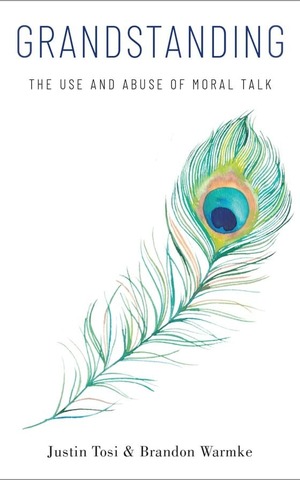

Regardless of whether youre witting or wrong, however, youre still grandstanding. And maybe the others actually are nasty pieces of work, while youre an upstanding citizen by comparison. Perhaps, like the Pharisee, you really think youre that good and others that bad. Interestingly, write Tosi and Warmke, You dont have to know youre grandstanding in order to grandstand, nor do you have to say anything false. All five forms of grandstanding are legion on social media, especially Twitter. The Pharisees prayer, for example, combines a strong emotion of disgust (toward lawbreakers and tax collectors) with an air of dismissiveness (as if the Pharisees righteousness were self-evident). Tosi and Warmke identify five, which they term piling on, ramping up, trumping up, expressing strong emotions, and dismissiveness. Grandstanding can take a number of forms. In other words, grandstanders want to impress others with their moral qualities, the authors write, and they try to satisfy that desire by saying something in public moral discourse. Grandstanding consists of two elements: Recognition Desire and Grandstanding Expression. Tosi and Warmke would describe the Pharisees prayer as an example of grandstanding, that is, the use of moral talk for self-promotion. According to Jesus, only the tax collector went home justified before God. The tax collector, on the other hand, prayed, God, have mercy on me, a sinner. I fast twice a week and give a tenth of all I get. The Pharisee prayed, God, I thank you that I am not like other people robbers, evildoers, adulterers or even like this tax collector. For example, Jesus once told a parable about a Pharisee and a tax collector who went to the temple to pray (Luke 18:914).

But with this duty comes a temptation to abuse moral talk. Proclaiming the moral excellency of Jesus and calling believers to imitate His example are among a Christian ministers most basic duties (e.g., Philippians 2:5 1 Peter 2:21 1 John 2:6). Moral talk is an intrinsic part of spiritual leadership. The answer is that Grandstanding trains a searchlight on the use and abuse of moral talk, in the words of its subtitle. So, you might wonder why Im recommending their book in a magazine for Christian ministers. Its authors evince no religious commitments one way or another, and they work from secular premises. ~GPW -– Justin Tosi and Brandon Warmkes Grandstanding is a work of philosophy informed by psychology.

So, please don\’t mistake how I applied the book to Christian ministers for the aims its authors intended. The book itself, however, works from secular premises, and the authors evince no particular religious commitment one way or another. My take on Grandstanding thus includes a reflection on what ministers might learn from this book. Influence is a Christian leadership magazine published by the Assemblies of God (USA). NOTE: I wrote the following review for the Sept/Oct 2020 issue of Influence magazine.


 0 kommentar(er)
0 kommentar(er)
